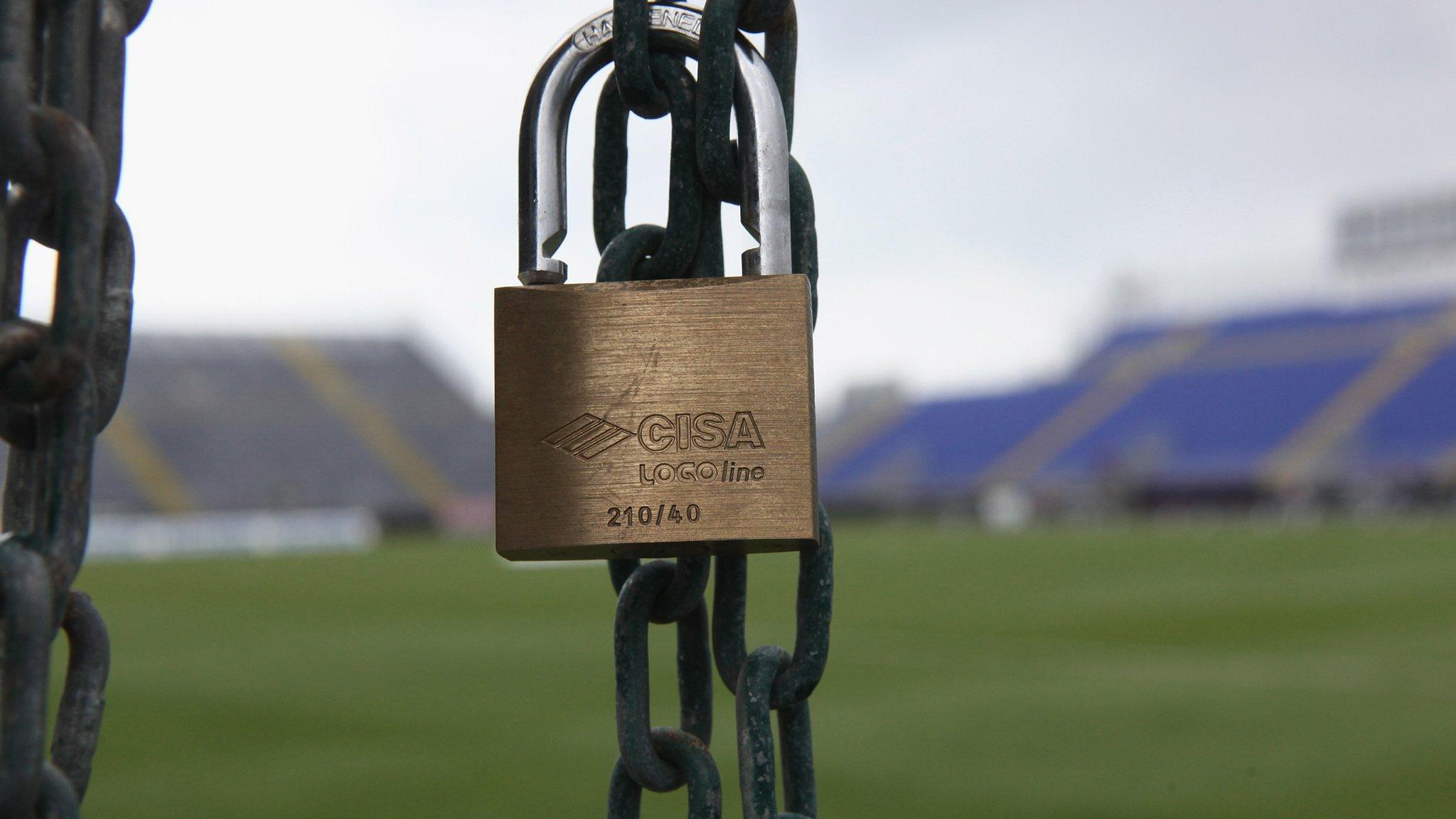Croatia v England: A 'ghost game' - what is it like to play behind closed doors?
- Published
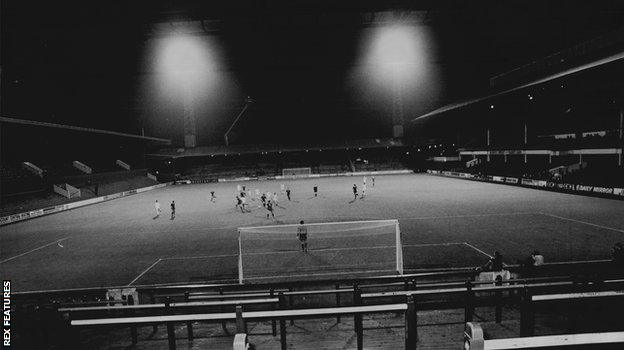
West Ham were the first English team to play behind closed doors in European club competition when they hosted Real Madrid Castilla - aka their B team - at an "eerie" Upton Park in 1980
They are known as 'ghost games' for good reason - playing in a top-class competitive match without a crowd is an "eerie experience" according to some of those to have done it.
That is the test that awaits England on Friday and, when Gareth Southgate's side line up at a virtually empty Stadion Rujevica for the Nations League tie against Croatia, it will also be a journey into the unknown.
No matter what happens on the pitch, the Three Lions will make history in Rijeka - because of Uefa sanctions against their hosts after a swastika was marked on their pitch before a game in 2015, England's 988th senior international since 1872 will be their first to be held behind closed doors.
It is a rare experience for English clubs too - only three have done it in the history of European club competition - West Ham, external in 1980, Aston Villa, external in 1982 and Manchester City in 2014.
English clubs to play behind closed doors in Europe | |||
|---|---|---|---|
Season | Competition | Game | Score |
1980-81 | European Cup Winners' Cup | West Ham v Real Madrid Castilla | 5-1 aet |
1982-83 | European Cup | Aston Villa v Besiktas | 3-1 |
2014-15 | Champions League | CSKA Moscow v Man City | 2-2 |
So, what will it be like? Hammers legends Trevor Brooking and Phil Parkes both played against Real Madrid Castilla - the Spanish giants' B team - in what went down in folklore as one of the most famous matches to be played at their old Upton Park home, because there were no fans there to watch it.
"It was a very, very surreal game," Parkes told BBC Sport. "Even now, I think: Did I dream that, or did it really happen?"
'The players could hear the radio commentary'
Brooking played 643 games in all competitions across 18 seasons during his glittering career for the Hammers, but the unique and peculiar circumstances of Wednesday, 1 October 1980 mean it stands out in his memory.
West Ham trailed 3-1 after the first leg of their European Cup Winners' Cup tie against Castilla - a game that had been marred by the trouble that led to the crowd ban - but back in east London they eventually prevailed 6-4 on aggregate after extra time.
The goals, including a hat-trick by David Cross, and the comeback are not what Brooking and Parkes remember most, however.
And, by the sound of things, John Murray and Ian Dennis, BBC Radio 5 live's co-commentators in Rijeka, might have an unusual audience.
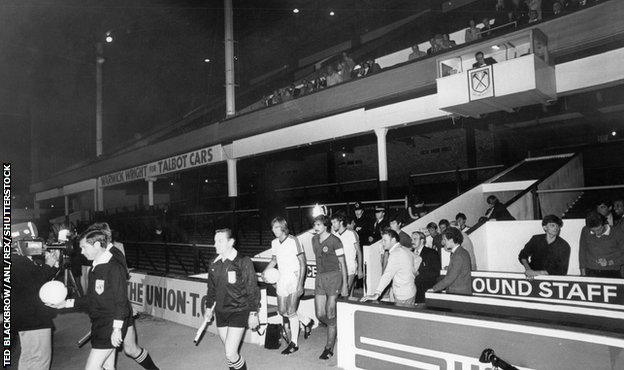
Upton Park had a capacity of 39,500 in 1980. The attendance for the game against Real Madrid Castilla was recorded as 262, which is the lowest in the club's history, but no fans were present
"It was very odd from the moment we ran out to warm up," Brooking explained.
"Normally you would have the noise of the crowd lifting you before the game and during it. There was always a fantastic atmosphere at Upton Park for the big games.
"But that night was very eerie. You could hear the radio commentary drifting across the pitch, and what the coaches were saying to themselves in the dugouts.
"In fact that was the only game in my whole career that I could hear everything that was said from the bench.
"One voice stood out above the others - Eddie Baily, a World War Two veteran as well as a former England international. He was our chief scout, and a man who definitely liked to see commitment from his players.
"Let's just say he was very vocal about it, and pretty volatile! Lots of his encouragement was related to the use of a bayonet.
"His voice could always be heard even when there was a crowd there and, that night, I am sure his cries of 'get stuck in' would have been heard from a long way away."
Applauding policemen - but no players' wives
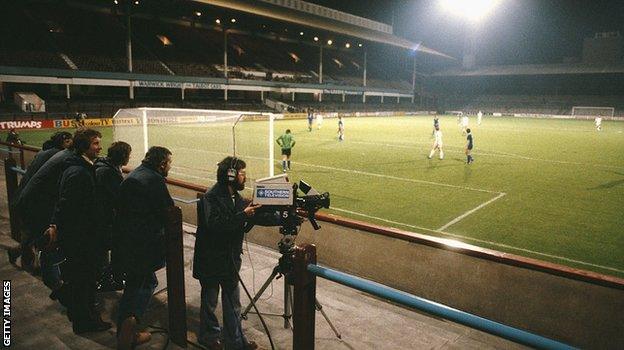
TV cameras were allowed into Upton Park but live coverage was not allowed and Uefa turned down requests to show the game via 'beamback' at local cinemas and Leyton Orient's Brisbane Road ground. Highlights of the game can been seen on YouTube, although one TV show at the time appears to have dubbed in crowd noise when the goals go in
Parkes, who played 444 games in goal for the Hammers between 1979 and 1990, says the Castilla game was the only one in his career that his wife was not able to watch.
Players were not given any tickets for family or friends, and the official attendance of 262 consisted of the players, match officials, administrative staff and the media.
That figure did not include some West Ham supporting policemen, whom Brooking recalls clapping the home goals from otherwise deserted terraces.
Unlike Friday's game, Uefa's ban included preventing any live TV coverage - just three minutes of action were permitted to be shown on the news., external
And because so few people were present, there are plenty of claims about what else went on - including that Parkes listened to commentary of the match on a ball boy's radio behind his goal in the second half.
"That's a myth, I'm afraid," Parkes said. "Most of the time I was listening to what was going on in the other box, which never happens in a normal game.
"But I do remember talking to one of our apprentices, who was stood behind the goal, in a quiet moment.
"We actually had all of the youth players spaced around the ground, in every stand. We only had one ball and there was no-one else to get it back when it went in there.
"They were flying around, doing their best, but even so, if the ball went up to Row Z of the Chicken Run, it would still take two or three minutes to come back if there was nobody near it."
How can England prepare for a unique occasion?
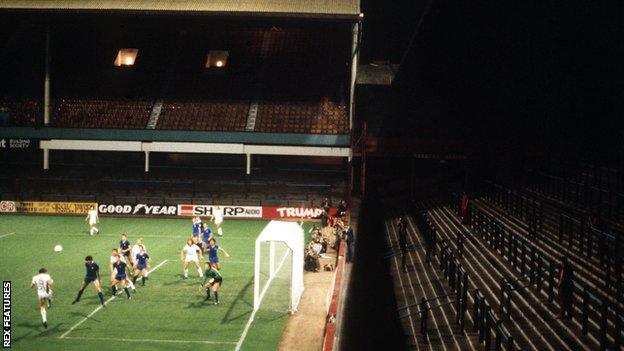
Playing under floodlights made the experience an even stranger one for Hammers goalkeeper Phil Parkes because he could not see beyond the edge of the pitch
The size of HNK Rijeka's tiny temporary home, which will become their training facility once their own ground is rebuilt, means getting the ball back is unlikely to pose a problem on Friday, but how can England prepare for such a unique challenge?
"We were certainly not looking forward to it," added Brooking. "But we did not want to lose in those circumstances.
"Our manager, John Lyall, organised a full-blooded practice game at Upton Park against our reserve side and asked them to treat it like a competitive game, to give us some idea of what it will be like to play there when it was so eerie, without any atmosphere."
Even that did not help the players too much, according to Parkes. While England will not get to train at Stadion Rujevika before the game, it is unlikely to affect their preparations.
"We trained at Upton Park during the day in the build-up to the game," says Parkes. "But the game was at night under floodlights, and that is what made it weird.
"During the day you can see everything around and outside the ground, but when you are playing and the floodlights are on you cannot actually see much beyond the edge of the pitch.
"So, when we scored it was almost as though you expected the crowd to cheer. There was no-one there of course, but you couldn't see that there was no-one there."
'It will feel like England are being punished if we lose'
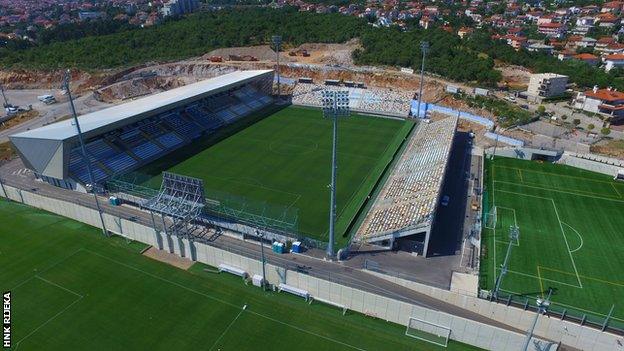
England will face Croatia under the floodlights on Friday night at the 8,279-capacity Stadion Rujevika, which will be empty apart from media, FA delegates, Uefa officials - and the players
According to newspaper reports at the time, hundreds of Hammers supporters gathered outside the ground to celebrate at the final whistle - the journalists who were present heard the club anthem 'I'm forever blowing bubbles' being sung.
Something similar could happen on Friday night because several England fans are still travelling to Rijeka, but it is unclear how close they will be able to get to the action.
"I am sure there are plenty of England fans who will still go across," added Brooking, who also played 44 times for England, including in front of crowds of more than 90,000 on eight occasions at Wembley, Hampden Park and in Eastern Europe.
"But it is a shame really - it will be an eerie night and another weird atmosphere and it just does not seem right for two of the top countries in the world to play in a little stadium like that, without a crowd.
"I would have thought Croatia switched it from Zagreb or Split to try to get some benefit but Gareth will not use it as an excuse whatever happens, and I am sure the players won't either - but it is certainly not ideal for such a prestigious match.
"The total lack of atmosphere will not do any justice to the game and I know from our experience that not having fans there will not help either team, the managers - anyone.
"It is not something I would want our players to suffer but West Ham got through it, which was great and I would like to think England will get something from it too.
"This is supposedly happening to punish Croatia but it will feel like England have been punished if we lose."
- Published10 October 2018
